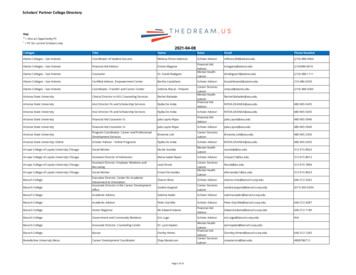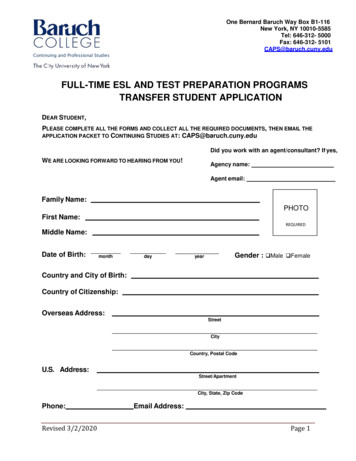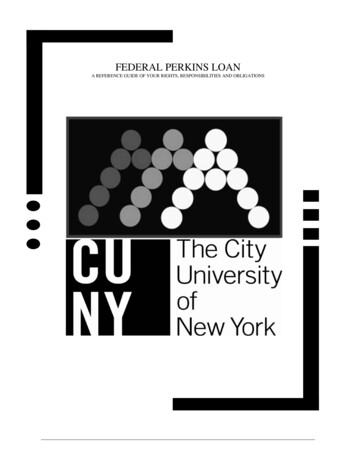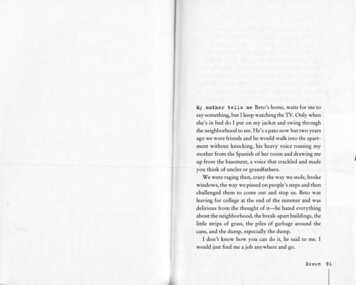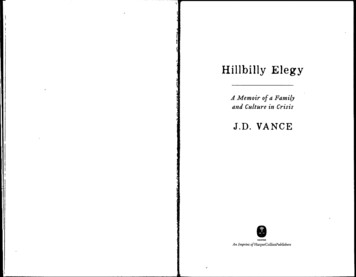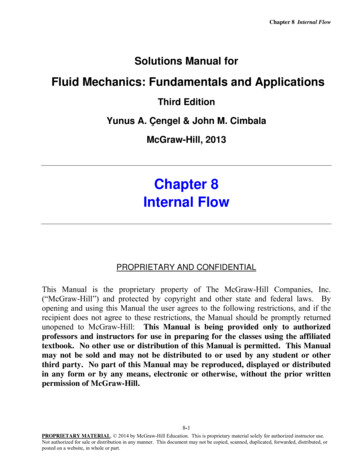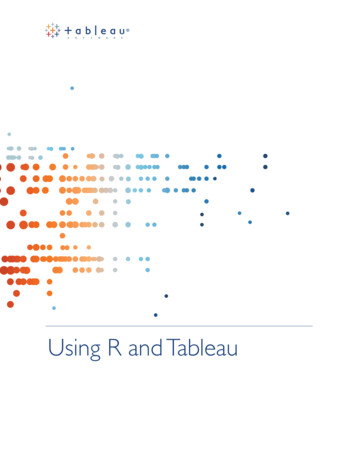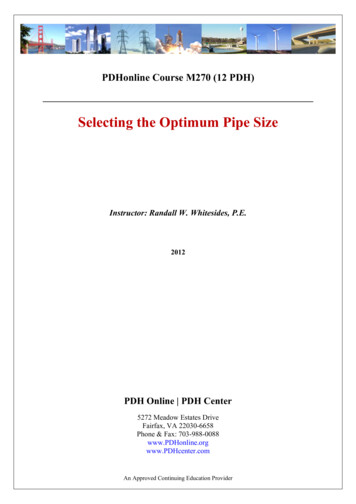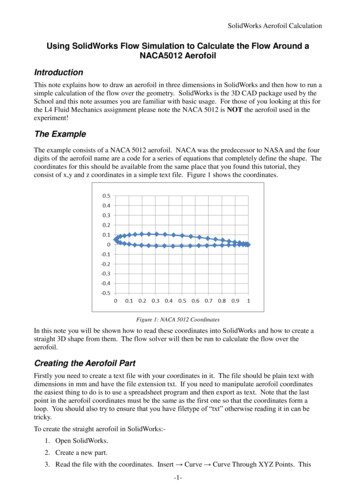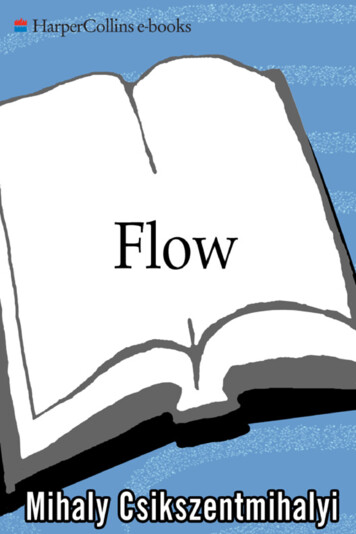
Transcription
flowThe Psychology of Optimal ExperienceMihaly Csikszentmihalyi
For Isabella, and Mark and Christopher
ContentsPreface1 Happiness Revisitedvii1Introduction1Overview5The Roots of Discontent8The Shields of Culture10Reclaiming Experience16Paths of Liberation202 The Anatomy of Consciousness23The Limits of Consciousness28Attention as Psychic Energy30Enter the Self33Disorder in Consciousness: Psychic Entropy36Order in Consciousness: Flow39Complexity and the Growth of the Self413 Enjoyment and the Quality of Life43Pleasure and Enjoyment45The Elements of Enjoyment48The Autotelic Experience674 The Conditions of Flow71Flow Activities72Flow and Culture77
The Autotelic Personality83The People of Flow905 The Body in Flow94Higher, Faster, Stronger96The Joys of Movement99Sex as Flow100The Ultimate Control: Yoga and the Martial Arts103Flow through the Senses: The Joys of Seeing106The Flow of Music108The Joys of Tasting1136 The Flow of Thought117The Mother of Science120The Rules of the Games of the Mind124The Play of Words128Befriending Clio132The Delights of Science134Loving Wisdom138Amateurs and Professionals139The Challenge of Lifelong Learning1417 Work as Flow143Autotelic Workers144Autotelic Jobs152The Paradox of Work157The Waste of Free Time1628 Enjoying Solitude and Other PeopleThe Conflict between Being Alone and Being with Others164165
The Pain of Loneliness168Taming Solitude173Flow and the Family175Enjoying Friends185The Wider Community1909 Cheating Chaos192Tragedies Transformed193Coping with Stress198The Power of Dissipative Structures201The Autotelic Self: A Summary20810 The Making of Meaning214What Meaning Means215Cultivating Purpose218Forging Resolve223Recovering Harmony227The Unification of Meaning in Life Themes230Notes241References281CoverCopyrightAbout the Publisher
PREFACETHIS BOOK SUMMARIZES, for a general audience, decades of research on thepositive aspects of human experience—joy, creativity, the process of totalinvolvement with life I call flow. To take this step is somewhat dangerous,because as soon as one strays from the stylized constraints of academicprose, it is easy to become careless or overly enthusiastic about such atopic. What follows, however, is not a popular book that gives insider tipsabout how to be happy. To do so would be impossible in any case, since ajoyful life is an individual creation that cannot be copied from a recipe.This book tries instead to present general principles, along with concreteexamples of how some people have used these principles, to transformboring and meaningless lives into ones full of enjoyment. There is nopromise of easy short-cuts in these pages. But for readers who care aboutsuch things, there should be enough information to make possible thetransition from theory to practice.In order to make the book as direct and user-friendly as possible, I haveavoided footnotes, references, and other tools scholars usually employ intheir technical writing. I have tried to present the results of psychologicalresearch, and the ideas derived from the interpretation of such research,in a way that any educated reader can evaluate and apply to his or her ownlife, regardless of specialized background knowledge.However, for those readers who are curious enough to pursue thescholarly sources on which my conclusions are based, I have includedvii
viii / Flowextensive notes at the end of the volume. They are not keyed to specificreferences, but to the page number in the text where a given issue is discussed. For example, happiness is mentioned on the very first page. Thereader interested in knowing what works I base my assertions on can turnto the notes section beginning and, by looking under the reference, find alead to Aristotle’s view of happiness as well as to contemporary researchon this topic, with the appropriate citations. The notes can be read as asecond, highly compressed, and more technical shadow version of theoriginal text.At the beginning of any book, it is appropriate to acknowledge thosewho have influenced its development. In the present case this is impossible,since the list of names would have to be almost as long as the book itself.However, I owe special gratitude to a few people, whom I wish to take thisopportunity to thank. First of all, Isabella, who as wife and friend has enriched my life for over twenty-five years, and whose editorial judgmenthas helped shape this work. Mark and Christopher, our sons, from whomI have learned perhaps as much as they have learned from me. Jacob Getzels, my once and future mentor. Among friends and colleagues I shouldlike to single out Donald Campbell, Howard Gardner, Jean Hamilton, PhilipHefner, Hiroaki Imamura, David Kipper, Doug Kleiber, George Klein,Fausto Massimini, Elisabeth Noelle-Neumann, Jerome Singer, James Stigler,and Brian Sutton-Smith—all of whom, in one way or another, have beengenerous with their help, inspiration, or encouragement.Of my former students and collaborators Ronald Graef, Robert Kubey,Reed Larson, Jean Nakamura, Kevin Rathunde, Rick Robinson, Ikuya Sato,Sam Whalen, and Maria Wong have made the greatest contributions to theresearch underlying the ideas developed in these pages. John Brockmanand Richard P. Kot have given their skillful professional support to thisproject and have helped it along from start to finish. Last but not least, indispensable over the past decade has been the funding generously providedby the Spencer Foundation to collect and analyze the data. I am especiallygrateful to its former president, H. Thomas James, to its present one,Lawrence A. Cremin, and to Marion Faldet, vice-president of the foundation.Of course, none of those mentioned above are responsible for what mightbe unsound in the book—that is exclusively my own doing.Chicago, March 1990
1HAPPINESSREVISITEDINTRODUCTIONTWENTY-THREE HUNDRED YEARS AGO Aristotle concluded that, more thananything else, men and women seek happiness. While happiness itself issought for its own sake, every other goal—health, beauty, money, orpower—is valued only because we expect that it will make us happy. Muchhas changed since Aristotle’s time. Our understanding of the worlds ofstars and of atoms has expanded beyond belief. The gods of the Greekswere like helpless children compared to humankind today and the powerswe now wield. And yet on this most important issue very little has changedin the intervening centuries. We do not understand what happiness is anybetter than Aristotle did, and as for learning how to attain that blessedcondition, one could argue that we have made no progress at all.Despite the fact that we are now healthier and grow to be older, despitethe fact that even the least affluent among us are surrounded by materialluxuries undreamed of even a few decades ago (there were few bathroomsin the palace of the Sun King, chairs were rare even in the richest medievalhouses, and no Roman emperor could turn on a TV set when he was bored),and regardless of all the stupendous scientific knowledge we can summonat will, people often end up feeling that their lives have been wasted, thatinstead of being filled with happiness their years were spent in anxiety andboredom.1
2 / FlowIs this because it is the destiny of mankind to remain unfulfilled, eachperson always wanting more than he or she can have? Or is the pervasivemalaise that often sours even our most precious moments the result of ourseeking happiness in the wrong places? The intent of this book is to usesome of the tools of modern psychology to explore this very ancient question: When do people feel most happy? If we can begin to find an answerto it, perhaps we shall eventually be able to order life so that happinesswill play a larger part in it.Twenty-five years before I began to write these lines, I made a discoverythat took all the intervening time for me to realize I had made. To call it a“discovery” is perhaps misleading, for people have been aware of it sincethe dawn of time. Yet the word is appropriate, because even though myfinding itself was well known, it had not been described or theoreticallyexplained by the relevant branch of scholarship, which in this case happensto be psychology. So I spent the next quarter-century investigating thiselusive phenomenon.What I “discovered” was that happiness is not something that happens.It is not the result of good fortune or random chance. It is not somethingthat money can buy or power command. It does not depend on outsideevents, but, rather, on how we interpret them. Happiness, in fact, is a condition that must be prepared for, cultivated, and defended privately byeach person. People who learn to control inner experience will be able todetermine the quality of their lives, which is as close as any of us can cometo being happy.Yet we cannot reach happiness by consciously searching for it. “Askyourself whether you are happy,” said J. S. Mill, “and you cease to be so.”It is by being fully involved with every detail of our lives, whether goodor bad, that we find happiness, not by trying to look for it directly. ViktorFrankl, the Austrian psychologist, summarized it beautifully in the prefaceto his book Man’s Search for Meaning: “Don’t aim at success—the more youaim at it and make it a target, the more you are going to miss it. For success,like happiness, cannot be pursued; it must ensue as the unintended sideeffect of one’s personal dedication to a course greater than oneself.”So how can we reach this elusive goal that cannot be attained by a directroute? My studies of the past quarter-century have convinced me that thereis a way. It is a circuitous path that begins with achieving control over thecontents of our consciousness.Our perceptions about our lives are the outcome of many forces thatshape experience, each having an impact on whether we feel good or bad.Most of these forces are outside our control. There is not much we can doabout our looks, our temperament, or our constitution. We
Mihaly Csikszentmihalyi / 3cannot decide—at least so far—how tall we will grow, how smart we willget. We can choose neither parents nor time of birth, and it is not in yourpower or mine to decide whether there will be a war or a depression. Theinstructions contained in our genes, the pull of gravity, the pollen in theair, the historical period into which we are born—these and innumerableother conditions determine what we see, how we feel, what we do. It is notsurprising that we should believe that our fate is primarily ordained byoutside agencies.Yet we have all experienced times when, instead of being buffeted byanonymous forces, we do feel in control of our actions, masters of our ownfate. On the rare occasions that it happens, we feel a sense of exhilaration,a deep sense of enjoyment that is long cherished and that becomes a landmark in memory for what life should be like.This is what we mean by optimal experience. It is what the sailor holdinga tight course feels when the wind whips through her hair, when the boatlunges through the waves like a colt—sails, hull, wind, and sea humminga harmony that vibrates in the sailor’s veins. It is what a painter feels whenthe colors on the canvas begin to set up a magnetic tension with each other,and a new thing, a living form, takes shape in front of the astonished creator.Or it is the feeling a father has when his child for the first time respondsto his smile. Such events do not occur only when the external conditionsare favorable, however: people who have survived concentration campsor who have lived through near-fatal physical dangers often recall that inthe midst of their ordeal they experienced extraordinarily rich epiphaniesin response to such simple events as hearing the song of a bird in the forest,completing a hard task, or sharing a crust of bread with a friend.Contrary to what we usually believe, moments like these, the best moments in our lives, are not the passive, receptive, relaxing times—althoughsuch experiences can also be enjoyable, if we have worked hard to attainthem. The best moments usually occur when a person’s body or mind isstretched to its limits in a voluntary effort to accomplish something difficultand worthwhile. Optimal experience is thus something that we make happen. For a child, it could be placing with trembling fingers the last blockon a tower she has built, higher than any she has built so far; for a swimmer,it could be trying to beat his own record; for a violinist, mastering an intricate musical passage. For each person there are thousands of opportunities,challenges to expand ourselves.Such experiences are not necessarily pleasant at the time they occur. Theswimmer’s muscles might have ached during his most memorable race,his lungs might have felt like exploding, and he might have been dizzywith fatigue—yet these could have been the best moments
4 / Flowof his life. Getting control of life is never easy, and sometimes it can bedefinitely painful. But in the long run optimal experiences add up to a senseof mastery—or perhaps better, a sense of participation in determining thecontent of life—that comes as close to what is usually meant by happinessas anything else we can conceivably imagine.In the course of my studies I tried to understand as exactly as possiblehow people felt when they most enjoyed themselves, and why. My firststudies involved a few hundred “experts”—artists, athletes, musicians,chess masters, and surgeons—in other words, people who seemed to spendtheir time in precisely those activities they preferred. From their accountsof what it felt like to do what they were doing, I developed a theory ofoptimal experience based on the concept of flow—the state in which peopleare so involved in an activity that nothing else seems to matter; the experience itself is so enjoyable that people will do it even at great cost, for thesheer sake of doing it.With the help of this theoretical model my research team at the Universityof Chicago and, afterward, colleagues around the world interviewedthousands of individuals from many different walks of life. These studiessuggested that optimal experiences were described in the same way bymen and women, by young people and old, regardless of cultural differences. The flow experience was not just a peculiarity of affluent, industrialized elites. It was reported in essentially the same words by old womenfrom Korea, by adults in Thailand and India, by teenagers in Tokyo, byNavajo shepherds, by farmers in the Italian Alps, and by workers on theassembly line in Chicago.In the beginning our data consisted of interviews and questionnaires.To achieve greater precision we developed with time a new method formeasuring the quality of subjective experience. This technique, called theExperience Sampling Method, involves asking people to wear an electronicpaging device for a week and to write down how they feel and what theyare thinking about whenever the pager signals. The pager is activated bya radio transmitter about eight times each day, at random intervals. At theend of the week, each respondent provides what amounts to a runningrecord, a written film clip of his or her life, made up of selections from itsrepresentative moments. By now over a hundred thousand such crosssections of experience have been collected from different parts of the world.The conclusions of this volume are based on that body of data.The study of flow I began at the University of Chicago has now spreadworldwide. Researchers in Canada, Germany, Italy, Japan, and Australiahave taken up its investigation. At present the most extensive collection ofdata outside of Chicago is at the Institute of Psychology of
Mihaly Csikszentmihalyi / 5the Medical School, the University of Milan, Italy. The concept of flow hasbeen found useful by psychologists who study happiness, life satisfaction,and intrinsic motivation; by sociologists who see in it the opposite of anomieand alienation; by anthropologists who are interested in the phenomenaof collective effervescence and rituals. Some have extended the implicationsof flow to attempts to understand the evolution of mankind, others to illuminate religious experience.But flow is not just an academic subject. Only a few years after it wasfirst published, the theory began to be applied to a variety of practical issues.Whenever the goal is to improve the quality of life, the flow theory canpoint the way. It has inspired the creation of experimental school curricula,the training of business executives, the design of leisure products and services. Flow is being used to generate ideas and practices in clinical psychotherapy, the rehabilitation of juvenile delinquents, the organization ofactivities in old people’s homes, the design of museum exhibits, and occupational therapy with the handicapped. All this has happened within adozen years after the first articles on flow appeared in scholarly journals,and the indications are that the impact of the theory is going to be evenstronger in the years to come.OVERVIEWAlthough many articles and books on flow have been written for the specialist, this is the first time that the research on optimal experience is beingpresented to the general reader and its implications for individual livesdiscussed. But what follows is not going to be a “how-to” book. There areliterally thousands of such volumes in print or on the remainder shelvesof book-stores, explaining how to get rich, powerful, loved, or slim. Likecookbooks, they tell you how to accomplish a specific, limited goal onwhich few people actually follow through. Yet even if their advice were towork, what would be the result afterward in the unlikely event that onedid turn into a slim, well-loved, powerful millionaire? Usually what happens is that the person finds himself back at square one, with a new list ofwishes, just as dissatisfied as before. What would really satisfy people isnot getting slim or rich, but feeling good about their lives. In the quest forhappiness, partial solutions don’t work.However well-intentioned, books cannot give recipes for how to behappy. Because optimal experience depends on the ability to control whathappens in consciousness moment by moment, each person has to achieveit on the basis of his own individual efforts and creativity. What a bookcan do, however, and what this one will try to accomplish,
6 / Flowis to present examples of how life can be made more enjoyable, ordered inthe framework of a theory, for readers to reflect upon and from which theymay then draw their own conclusions.Rather than presenting a list of dos and don’ts, this book intends to bea voyage through the realms of the mind, charted with the tools of science.Like all adventures worth having it will not be an easy one. Without someintellectual effort, a commitment to reflect and think hard about your ownexperience, you will not gain much from what follows.Flow will examine the process of achieving happiness through controlover one’s inner life. We shall begin by considering how consciousness works,and how it is controlled (chapter 2), because only if we understand the waysubjective states are shaped can we master them. Everything we experience—joy or pain, interest or boredom—is represented in the mind as information. If we are able to control this information, we can decide whatour lives will be like.The optimal state of inner experience is one in which there is order inconsciousness. This happens when psychic energy—or attention—is investedin realistic goals, and when skills match the opportunities for action. Thepursuit of a goal brings order in awareness because a person must concentrate attention on the task at hand and momentarily forget everything else.These periods of struggling to overcome challenges are what people findto be the most enjoyable times of their lives (chapter 3). A person who hasachieved control over psychic energy and has invested it in consciouslychosen goals cannot help but grow into a more complex being. By stretchingskills, by reaching toward higher challenges, such a person becomes anincreasingly extraordinary individual.To understand why some things we do are more enjoyable than others,we shall review the conditions of the flow experience (chapter 4). “Flow” isthe way people describe their state of mind when consciousness is harmoniously ordered, and they want to pursue whatever they are doing for itsown sake. In reviewing some of the activities that consistently produceflow—such as sports, games, art, and hobbies—it becomes easier to understand what makes people happy.But one cannot rely solely on games and art to improve the quality oflife. To achieve control over what happens in the mind, one can draw uponan almost infinite range of opportunities for enjoyment—for instance,through the use of physical and sensory skills ranging from athletics to musicto Yoga (chapter 5), or through the development of symbolic skills such aspoetry, philosophy, or mathematics (chapter 6).Most people spend the largest part of their lives working and interactingwith others, especially with members of their families. There-
Mihaly Csikszentmihalyi / 7fore it is crucial that one learn to transform jobs into flow-producing activities(chapter 7), and to think of ways of making relations with parents, spouses,children, and friends more enjoyable (chapter 8).Many lives are disrupted by tragic accidents, and even the most fortunateare subjected to stresses of various kinds. Yet such blows do not necessarilydiminish happiness. It is how people respond to stress that determineswhether they will profit from misfortune or be miserable. Chapter 9 describes ways in which people manage to enjoy life despite adversity.And, finally, the last step will be to describe how people manage to joinall experience into a meaningful pattern (chapter 10). When that is accomplished, and a person feels in control of life and feels that it makes sense,there is nothing left to desire. The fact that one is not slim, rich, or powerfulno longer matters. The tide of rising expectations is stilled; unfulfilled needsno longer trouble the mind. Even the most humdrum experiences becomeenjoyable.Thus Flow will explore what is involved in reaching these aims. How isconsciousness controlled? How is it ordered so as to make experience enjoyable? How is complexity achieved? And, last, how can meaning be created? The way to achieve these goals is relatively easy in theory, yet quitedifficult in practice. The rules themselves are clear enough, and withineveryone’s reach. But many forces, both within ourselves and in the environment, stand in the way. It is a little like trying to lose weight: everyoneknows what it takes, everyone wants to do it, yet it is next to impossiblefor so many. The stakes here are higher, however. It is not just a matter oflosing a few extra pounds. It is a matter of losing the chance to have a lifeworth living.Before describing how the optimal flow experience can be attained, it isnecessary to review briefly some of the obstacles to fulfillment implicit inthe human condition. In the old stories, before living happily ever after thehero had to confront fiery dragons and wicked warlocks in the course ofa quest. This metaphor applies to the exploration of the psyche as well. Ishall argue that the primary reason it is so difficult to achieve happinesscenters on the fact that, contrary to the myths mankind has developed toreassure itself, the universe was not created to answer our needs. Frustrationis deeply woven into the fabric of life. And whenever some of our needsare temporarily met, we immediately start wishing for more. This chronicdissatisfaction is the second obstacle that stands in the way of contentment.To deal with these obstacles, every culture develops with time protectivedevices—religions, philosophies, arts, and comforts—that
8 / Flowhelp shield us from chaos. They help us believe that we are in control ofwhat is happening and give reasons for being satisfied with our lot. Butthese shields are effective only for a while; after a few centuries, sometimesafter only a few decades, a religion or belief wears out and no longerprovides the spiritual sustenance it once did.When people try to achieve happiness on their own, without the supportof a faith, they usually seek to maximize pleasures that are either biologically programmed in their genes or are out as attractive by the society inwhich they live. Wealth, power, and sex become the chief goals that givedirection to their strivings. But the quality of life cannot be improved thisway. Only direct control of experience, the ability to derive moment-bymoment enjoyment from everything we do, can overcome the obstacles tofulfillment.THE ROOTS OF DISCONTENTThe foremost reason that happiness is so hard to achieve is that the universewas not designed with the comfort of human beings in mind. It is almostimmeasurably huge, and most of it is hostilely empty and cold. It is thesetting for great violence, as when occasionally a star explodes, turning toashes everything within billions of miles. The rare planet whose gravityfield would not crush our bones is probably swimming in lethal gases.Even planet Earth, which can be so idyllic and picturesque, is not to betaken for granted. To survive on it men and women have had to strugglefor millions of years against ice, fire, floods, wild animals, and invisiblemicroorganisms that appear out of nowhere to snuff us out.It seems that every time a pressing danger is avoided, a new and moresophisticated threat appears on the horizon. No sooner do we invent a newsubstance than its by-products start poisoning the environment. Throughouthistory, weapons that were designed to provide security have turnedaround and threatened to destroy their makers. As some diseases arecurbed, new ones become virulent; and if, for a while, mortality is reduced,then overpopulation starts to haunt us. The four grim horsemen of theApocalypse are never very far away. The earth may be our only home, butit is a home full of booby traps waiting to go off at any moment.It is not that the universe is random in an abstract mathematical sense.The motions of the stars, the transformations of energy that occur in itmight be predicted and explained well enough. But natural processes donot take human desires into account. They are deaf and blind
Mihaly Csikszentmihalyi / 9to our needs, and thus they are random in contrast with the order we attempt to establish through our goals. A meteorite on a collision course withNew York City might be obeying all the laws of the universe, but it wouldstill be a damn nuisance. The virus that attacks the cells of a Mozart is onlydoing what comes naturally, even though it inflicts a grave loss on humankind. “The universe is not hostile, nor yet is it friendly,” in the words of J.H. Holmes. “It is simply indifferent.”Chaos is one of the oldest concepts in myth and religion. It is rather foreignto the physical and biological sciences, because in terms of their laws theevents in the cosmos are perfectly reasonable. For instance, “chaos theory”in the sciences attempts to describe regularities in what appears to be utterlyrandom. But chaos has a different meaning in psychology and the otherhuman sciences, because if human goals and desires are taken as thestarting point, there is irreconcilable disorder in the cosmos.There is not much that we as individuals can do to change the way theuniverse runs. In our lifetime we exert little influence over the forces thatinterfere with our well-being. It is important to do as much as we can toprevent nuclear war, to abolish social injustice, to eradicate hunger anddisease. But it is prudent not to expect that efforts to change external conditions will immediately improve the quality of our lives. As J. S. Millwrote, “No great improvements in the lot of mankind are possible, until agreat change takes place in the fundamental constitution of their modes ofthought.”How we feel about ourselves, the joy we get from living, ultimately depend directly on how the mind filters and interprets everyday experiences.Whether we are happy depends on inner harmony, not on the controls weare able to exert over the great forces of the universe. Certainly we shouldkeep on learning how to master the external environment, because ourphysical survival may depend on it. But such mastery is not going to addone jot to how good we as individuals feel, or reduce the chaos of the worldas we experience it. To do that we must learn to achieve mastery overconsciousness itself.Each of us has a picture, however vague, of what we would like to accomplish before we die. How close we get to attaining this goal becomesthe measure for the quality of our lives. If it remains beyond reach, wegrow resentful or resigned; if it is at least in part achieved, we experiencea sense of happiness and satisfaction.For the majority of people on this earth, life goals are simple: to survive,to leave children who will in turn survive, and, if possible, to do so with acertain amount of comfort and dignity. In the favelas
10 / Flowspreading around South American cities, in the drought-stricken regionsof Africa, among the millions of Asians who have to solve the problem ofhunger day after day, there is not much else to hope for.But as soon as these basic problems of survival are solved, merely havingenough food and a comfortable shelter is no longer sufficient to makepeople content. New needs are felt, new desires arise. With affluence andpower come escalating expectations, and as our level of wealth and comfortskeeps increasing, the sense of well-being we hoped to achieve keeps receding into the distance. When Cyrus the Great had ten thousand cooks preparenew dishes for his table, the rest of Persia had barely enough to eat. Thesedays every household in the “first world” has access to the recipes of themost diverse land
THIS BOOK SUMMARIZES, for a general audience, decades of research on the positive aspects of human experience—joy, creativity, the process of total involvement with life I call flow. T

